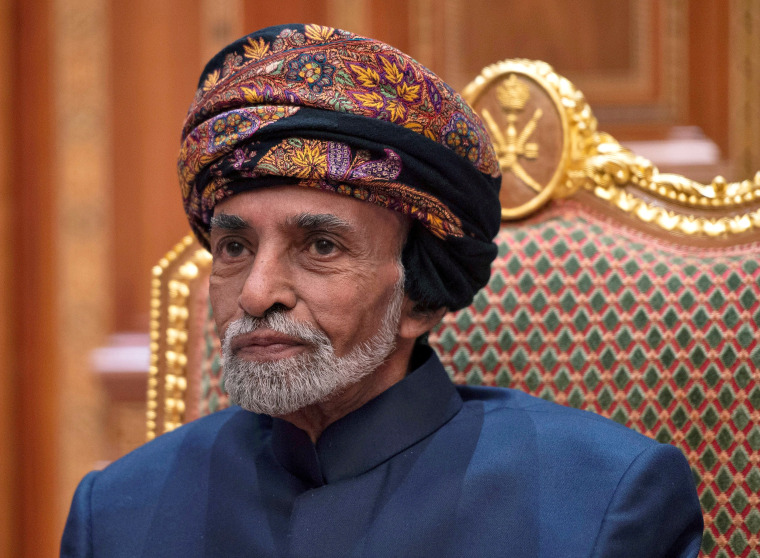The Sultan of Oman, Qaboos bin Said, an esteemed mediator and broker in a deeply divided region, has died. He was 79.
The long-time sultan has ruled over Oman, a Gulf state situated on the southeastern edge of the Arabian Peninsula, for almost fifty years after overthrowing his father in a bloodless coup in 1970.
The state-run Oman News Agency announced his death late Friday on its official Twitter account. The royal court declared three days of mourning.
The elderly ruler returned to Oman in December after seeking medical treatment in Belgium, according to Reuters. He has traveled abroad for medical reasons at least twice since 2014, the news agency reported.
The news agency mourned the death of the Sultan and praised the “towering renaissance” he had presided over. It said his “balanced policy” of mediating between rival camps in a volatile region had earned the world's respect.
The sultan’s death had raised the risk of unrest in this country on the eastern edge of the Arabian Peninsula.
The unmarried Sultan Qaboos had no children and did not publicly name an heir, a tradition among the ruling Al Said dynasty whose history is replete with bloody takeovers. But within hours, Oman state television announced Haitham bin Tariq Al Said, who had served as culture minister, as the new sultan.
Said had secretly recorded his first and second choices in two sealed envelopes held in two different regions, according to Marc Valeri, director of the Centre for Gulf Studies at the University of Exeter.
Ilan Goldenberg, the director of the Middle East Security Program at the Center for a New American Security, a Washington-based think tank, said succession was always a challenge when you have someone who has ruled for some 50 years.
But he said he hoped Oman's new sultan could pursue a similar foreign strategy to Said, whose rule has been defined by a low-key foreign policy that has focused on neutrality in geopolitical issues as well as mediation between foes.
“It’s served Oman well and it’s also been good for the region,” he said. “We need more players like Oman, frankly.”
Haitham's rule was likely to be characterized by continuity, particularly with regard to its role in diplomacy, said Jeremy Jones, a senior associate member of the Oxford Centre for Islamic Studies and an author on the country.
"What turns out to be notable about the Omani succession is that it has proceeded very smoothly," he said.
"Within a few hours of the death of Sultan Qaboos the new sultan was chosen and sworn in after which the funeral of Sultan Qaboos took place. The atmosphere on the street in Muscat is calm and sombre," he said, referring to the country's capital.
Haitham's message to Omanis and the world was clear: Oman would continue down the path laid by Qaboos as a facilitator of peace.
“We will follow the same line as the late sultan, and the principles that he asserted for the foreign policy of our country, of peaceful coexistence among nations and people, and good neighborly behavior of non-interference in the affairs of others," he said in his first public remarks as sultan.
Oman has long been an interlocutor of the West with Iran and has also refused to support a side in a dispute within the Gulf Cooperation Council which saw the United Arab Emirates, Bahrain and Saudi Arabia cut ties and blockade Qatar in 2017.
Under Said, the sultanate has had a quiet role in fostering negotiations between the Israelis and Palestinians and has openly called for a Palestinian state while also acknowledging a need for an Israeli nation.
Last year, Israeli Prime Minister Benjamin Netanyahu visited the Gulf state, joining Said in the first meeting of its kind in more than 20 years.
“It is one of the few countries in the Middle East that does not get embroiled in civil conflicts and regional rivalries,” said Fawaz Gerges, a professor at the London School of Economics and Political Science. “This is the signature of Sultan Qaboos.”
Domestically, after ousting his father in 1970, Said presided over a range of modernization and infrastructure projects including constructing schools, hospitals and port facilities, according to Encyclopaedia Britannica. He also focused on pacifying civil and tribal strife within Oman, co-opting dissidents and marking the end of civil and tribal wars and the beginning of peace, according to Gerges.
Internationally, one of Said’s most extraordinary diplomatic feats was the fostering of secret talks between the U.S. and Iranian representatives in Oman, that gave birth to the 2015 nuclear deal with world powers.
“Qaboos actually personally developed a relationship with the Supreme leader, Ali Khamenei, that pretty much very few leaders in the world have,” said Goldenberg.
It “speaks to his personal diplomacy and effectiveness,” he added.
It was originally Said’s ability to negotiate the release of American backpackers who were detained by Iranian officials while hiking together along the Iran-Iraq border in 2009, that convinced the Obama administration that Said had direct ties and sway with Iran’s leadership, Goldenberg said.
“That’s why the Omani’s became the key channel,” he added. “It’s also easier to hide the channel because Oman is this low-key, under the radar player.”
